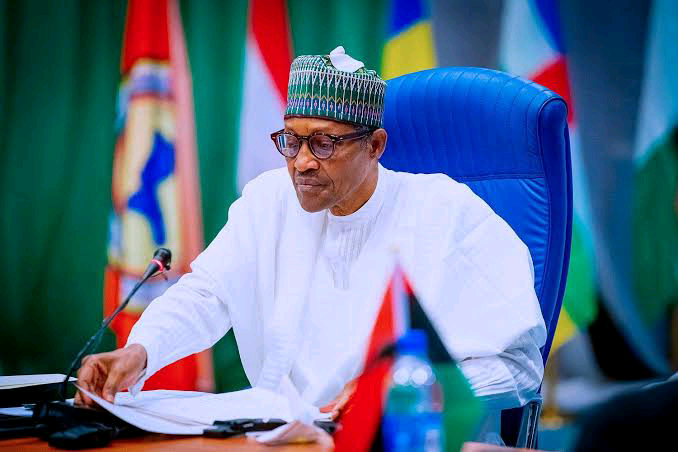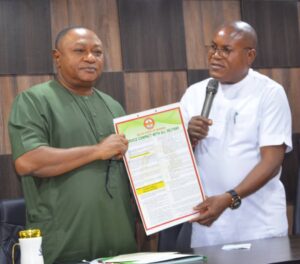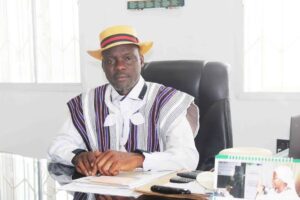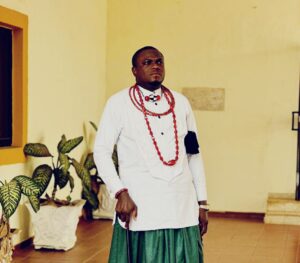Electoral Act: Buhari surrenders to APC governors

The federal lawmakers in both chambers of the National Assembly have lost out in the battle for the direct primaries as the only option for political parties to pick their candidates ahead of forthcoming general elections and subsequent elections in the country.
President Muhammadu Buhari in a letter addressed to the President of the Senate and Chairman of the National Assembly explained why he declined his assent to the Electoral Act Amendment Bill.
He declared that the last November resolution of the National Assembly which gave direct primary as the sole option open to political parties to pick their candidates was undemocratic and an infringement on fundamental rights.
With the development, the lawmakers have lost the battle to the governors who have been smarting for the retention of provisions in the APC 2014 Constitution (as amended) which makes provisions for three options: Direct, Indirect and consensus arrangement.
Checks revealed that the same options are available in the main opposition party, Peoples Democratic Party (PDP) guidelines for primaries.
Speaking with newsmen at the end of the meeting of the Forum of APC Governors held last month, Kebbi State Governor and Chairman of the Progressive Governors Forum, Abubakar Atiku Bagudu said the direct option would overstretch the Independent
Atiku Bagudu said the direct option would overstretch the Independent National Electoral Commission. He further argued that limiting the options open to political parties was undemocratic.
He further argued that direct primary was too cumbersome, unwieldy and would overstretch the limited resources of the Independent National Electoral Commission, statutorily mandated to oversee primaries conducted by political parties.
He said: “We discussed the pros and cons. There has been concern that political parties are voluntary organisations. We express the concern that political parties be allowed to choose from the options that they so desire. There is an Executive Order, signed by Mr President against large gathering. These are issues we discussed and hope that the best be achieved for Nigeria.
“We also noted that our ward congresses were results of direct Primaries. The process involves multiple roles by INEC. IF we have to involve INEC, their resources will be overstretched.”
In the letter addressed to the Senate President, Ahmad Lawan, President Buhari said that the various security situation in the country will not allow him to sign the Bill.
Among other reasons, President Buhari cited the high cost of conducting direct primaries, the security challenge of monitoring the election, violations of citizens rights and marginalisation of small political parties.
President Buhari also noted that adopting Direct Primaries also have implications on the rights of citizens to participate in government as Constitutionally ensured.
President Buhari further maintained that proceeding with Direct Primaries will lead to significant spike in the cost of conducting elections by parties as well as an increase in the cost of monitoring such elections by the Independent National Electoral Commission, INEC.
He further raised concern on the indirect consequences of the high cost and monetization of the process as it will increase the financial cost and put further strain on the economy.
In his view, it will also strangulate smaller parties financially, considering the enormous resources required to mobilize all party members for the Primaries. He submitted that such a situation is not healthy for the sustenance of multi-party democracy in Nigeria.
He further declared that security agencies will also be overstretched as direct primary will be open to participation from all and sundry and such a large turnout will lack effective security coordination, engender intimidation and disruption, thereby raising credibility issues on the outcome of such elections.
He said: “Significantly, the amendment as proposed is a violation of the underlying spirit of democracy which is characterised by freedom of choices. Political party membership is a voluntary exercise of the Constitutional right of freedom of association.”
He also said the proposed amendment will lead to a plethora of litigations based on diverse grounds and issues of law including but not limited to the fact that the proposed amendment could not work in retrospect, given the existing Constitutional provisions of parties already registered with the INEC which permit direct, indirect and Consensus primaries.
End
Electoral Act: Buhari surrenders to APC governors
The federal lawmakers in both chambers of the National Assembly have lost out in the battle for the direct primaries as the only option for political parties to pick their candidates ahead of forthcoming general elections and subsequent elections in the country.
President Muhammadu Buhari in a letter addressed to the President of the Senate and Chairman of the National Assembly explained why he declined his assent to the Electoral Act Amendment Bill.
He declared that the last November resolution of the National Assembly which gave direct primary as the sole option open to political parties to pick their candidates was undemocratic and an infringement on fundamental rights.
With the development, the lawmakers have lost the battle to the governors who have been smarting for the retention of provisions in the APC 2014 Constitution (as amended) which makes provisions for three options: Direct, Indirect and consensus arrangement.
Checks revealed that the same options are available in the main opposition party, Peoples Democratic Party (PDP) guidelines for primaries.
Speaking with newsmen at the end of the meeting of the Forum of APC Governors held last month, Kebbi State Governor and Chairman of the Progressive Governors Forum, Abubakar Atiku Bagudu said the direct option would overstretch the Independent
Atiku Bagudu said the direct option would overstretch the Independent National Electoral Commission. He further argued that limiting the options open to political parties was undemocratic.
He further argued that direct primary was too cumbersome, unwieldy and would overstretch the limited resources of the Independent National Electoral Commission, statutorily mandated to oversee primaries conducted by political parties.
He said: “We discussed the pros and cons. There has been concern that political parties are voluntary organisations. We express the concern that political parties be allowed to choose from the options that they so desire. There is an Executive Order, signed by Mr President against large gathering. These are issues we discussed and hope that the best be achieved for Nigeria.
“We also noted that our ward congresses were results of direct Primaries. The process involves multiple roles by INEC. IF we have to involve INEC, their resources will be overstretched.”
In the letter addressed to the Senate President, Ahmad Lawan, President Buhari said that the various security situation in the country will not allow him to sign the Bill.
Among other reasons, President Buhari cited the high cost of conducting direct primaries, the security challenge of monitoring the election, violations of citizens rights and marginalisation of small political parties.
President Buhari also noted that adopting Direct Primaries also have implications on the rights of citizens to participate in government as Constitutionally ensured.
President Buhari further maintained that proceeding with Direct Primaries will lead to significant spike in the cost of conducting elections by parties as well as an increase in the cost of monitoring such elections by the Independent National Electoral Commission, INEC.
He further raised concern on the indirect consequences of the high cost and monetization of the process as it will increase the financial cost and put further strain on the economy.
In his view, it will also strangulate smaller parties financially, considering the enormous resources required to mobilize all party members for the Primaries. He submitted that such a situation is not healthy for the sustenance of multi-party democracy in Nigeria.
He further declared that security agencies will also be overstretched as direct primary will be open to participation from all and sundry and such a large turnout will lack effective security coordination, engender intimidation and disruption, thereby raising credibility issues on the outcome of such elections.
He said: “Significantly, the amendment as proposed is a violation of the underlying spirit of democracy which is characterised by freedom of choices. Political party membership is a voluntary exercise of the Constitutional right of freedom of association.”
He also said the proposed amendment will lead to a plethora of litigations based on diverse grounds and issues of law including but not limited to the fact that the proposed amendment could not work in retrospect, given the existing Constitutional provisions of parties already registered with the INEC which permit direct, indirect and Consensus primaries.



